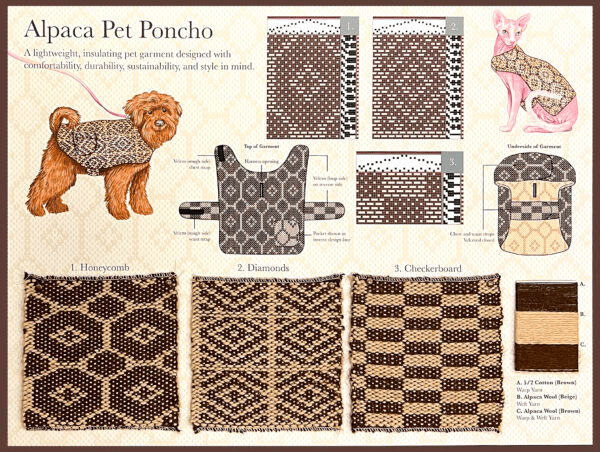Fashion Institute of Technology graduate Kayla Reilly placed first in the 19th Annual North American Student Design Competition sponsored by the Alpaca Owners Association (AOA) in the textile design category.
Reilly, of Suffolk County, NY, has been aware of alpacas for many years but first became aware of their fiber properties when doing research for a 2022 trip to Peru.
“I feel like this is a fiber that can and should be more widely utilized. At face value, alpaca is desirable due to its hand alone,” said Reilly. “However, once you begin to learn of its many strengths, you realize that this fiber is ideal for a vast array of applications.”
The competition was created to promote the use of alpaca fiber in fashion, textile and interior design at the fundamental level of educational institutions. The theme for this year’s competition was Alpaca: The Earth Friendly Fiber.
The competition is divided into two categories: fashion design and textile design. Entries required a presentation board, swatches and a one-page essay. Finalists were announced and their designs displayed at the AOA National Education and Fiber Conference July 14-16 and are listed at https://www.alpacainfo.com/student-design-competition
The top three entries in each category and the winning essay received cash scholarships and will be spotlighted in the award-winning nationally distributed publication Alpacas Magazine.
Reilly’s design is a beautiful and unique pet poncho. “Almost everyone I know has a pet and loves and treats them like they are family,” said Reilly. “Looking around NYC, I see people walking their pets with an increasing number of accessories. Knowing the amount of money my own friends and family spend on pet fashion, I began to look into the statistics and became aware of just how large and viable of a market the pet product industry is. It became clear to me that alpaca wool would be a perfect fit for a pet garment because of its antibacterial, moisture wicking, strength, and resilience properties.”
“The Alpaca Pet Poncho is a woven pet garment made of 80% Alpaca Wool,” Reilly continued. “Designed with comfort and durability in mind, the Alpaca Pet Poncho is light weight, reversible and allergen free. Made for dogs and cats alike, the Alpaca Pet Poncho comes in two design options, a contemporary honeycomb and a traditional diamond design.”
The Student Design Competition is judged by industry professionals who provide a critique for each entry. The scoring is based on an evaluation of individual entries rather than a comparative system.
“Sustainability has become such a hot keyword in recent years. With many consumers becoming aware of the negative impact of the textile industry on both the Earth and their health, Alpaca Wool is a welcome alternative due to the fact that it can be sustainably harvested and requires no chemical treatment during industrial production,” notes Reilly.
About Alpaca Fiber
Finer grades of alpaca fiber are believed to be hypo-allergenic, meaning it is less likely to cause irritation from allergen particles. Unlike sheep’s wool, alpaca fiber contains no lanolin and is therefore ready to spin after only nominal cleaning. Prized for its unique silky feel and superb “handle,” alpaca fiber is highly sought-after by both cottage-industry artists (hand spinners, knitters, weavers, etc.) as well as the commercial fashion industry.
Alpaca fiber has a variety of natural colors, making it very desirable. Sixteen colors are officially recognized (white; beige; and shades of fawn, brown, black, and grey) with many additional subtle shades and hues. White, light fawn, and light grey can be easily dyed to offer a rainbow of colors for the fiber artist. Combining alpaca fiber with other fine fibers such as merino wool, cashmere, mohair, silk, or angora can produce incredibly interesting blends.
To learn more about the Alpaca Owners Association visit www.alpacainfo.com.








Recent Comments